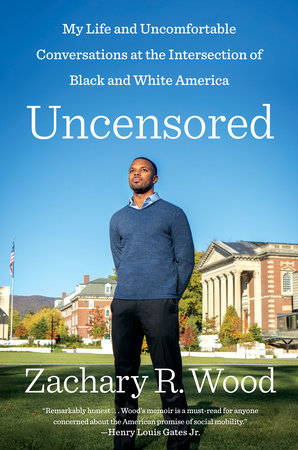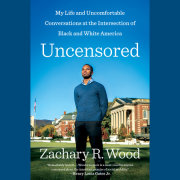Chapter 1
Crossroads
My mother was the first person I desperately tried to understand. She was five feet seven with mahogany skin and a beautiful smile. She was born in Fort Worth, Texas, but spent most of her childhood in Detroit. She was a people person, with excellent soft skills, and she rarely made anything less than a great first impression when she wanted to.
But I could never take her words at face value. When I was about four years old she sat me down and told me in graphic detail what my father had done that forced her to leave him. She sat, unblinking, her face mere inches from mine. "Your father," she said slowly through clenched teeth, drawing each word out as she gestured with the lit cigarette that dangled from between her fingers, "took me by my shoulders and threw me down on the ground. He pinned me there, Zachary," she continued, "calling me a fucking bitch and holding me down with all his strength until I could hardly breathe."
I was terrified. I didn't want to hear any more, but even at the age of four I knew better than to interrupt my mother when she was speaking. "Then he picked me up," she said, her brow knit and eyes focused, "and threw me against the wall. It hurt to walk, but I ran into your room to get you so that we could leave. But your father blocked the doorway and refused to let us out."
I was later told that when my father left for work the next morning, my mother borrowed money from a friend to rent an apartment, and the two of us moved out of our house in Forestville, Maryland. For weeks, my dad had no idea where my mom and I were. During that time, she filled my head with lies about my father, repeating this violent, graphic story over and over with her voice and eyes full of fear and anger.
I had nightmares about my father knocking my mom over, slapping her, and throwing her to the ground. But had he done those things? My young mind was confused. The details of his beatings were there in my memory, but they didn't feel the same as other memories that I knew to be true. I couldn't tell what was real.
Finally, my mom's mom, whom I called Lola, convinced my mother to let me see my father again. I was so happy to be back home at his house, but I was also confused. All weekend, I wouldn't stop asking my father questions about what had happened between him and my mom. "Daddy, did you hurt Mommy? Did you hit her?"
"No," he said with a sigh. "That's not how I remember it." He never said she was lying. But I sensed from spending time with my father that her stories were biased. I loved being with my dad. He was at work a lot, but when he got home he'd throw some meat and vegetables into the oven and take me to the park to play. My dad has always been a gym rat. He's in great shape to this day, and when I was a kid he had at least as much energy as I did. And I always had a lot of energy.
This was how my dad showed his affection-by doing rather than saying. He was emotionally reserved but engaged, a man of few words. He rarely told me that he loved me, but he showed me clearly that he did by always being there, ready to play with me and make his best efforts at answering my endless questions. No matter how exhausted or frustrated he was, he never raised his voice. His house, which I still thought of as home, was a place of peace.
It was in direct contrast to life with my mom, and I missed my dad terribly when he wasn't around. A few months after we'd moved out of my dad's house, we were going through a drive-through when I told my mom, "I want to be with my dad."
Now, this memory is crystal clear. My mom took the bag of food and sped off, abruptly stopping the car a few yards away. She reached over to the passenger seat, grabbed me, and forcefully placed me in her lap. She put her hands on my shoulders and began shaking me aggressively.
"No, Zachary," she said over and over as she shook me. "No, no, no, no, no." I felt dizzy. "Tell me you love me." She kept on shaking me. My head was spinning. "Tell me that you want to live with me." I just cried. I was so scared. I had never seen her that angry. "Tell me, Zachary."
"Yes," I finally said in a small voice, and she abruptly stopped. I was still crying, and my head hurt, but she placed me back in my seat and drove off as if nothing had happened. I didn't say a word for the rest of the day.
When I think about these early memories, I try to reconcile them with the many times my mom said, "If you fail at raising your children, nothing else in life really matters." It was a paraphrase of her favorite quotation from Jacqueline Kennedy, whom she admired for her elegance and sophistication. When I think about the fear and pain I felt as a child, I try to remember the amazing birthday parties my mother threw for me and the times she sat me down one-on-one and said, "Zachary, I love you more than you will ever know. Honey, I love you more than life itself."
Even when I resented her for how she made me feel, I loved my mother dearly, just as I do now. As I look back, it's easier to see how as a little kid my mind was overwhelmed by the expectation of her rage. Though I never doubted that she loved me, the abuse I endured often made it difficult for me to feel her love.
Different people yell at varying levels of intensity-a raised voice, a shout, a quick holler. When my mother yelled, it was as if all her rage were being unleashed-and she had a lot of rage. She yelled with high intensity for as long as she could. Many times, she'd scream at me until her voice became hoarse. Then she'd take a break and start yelling again when her voice returned.
While she was yelling, I had to stand up straight and still and maintain eye contact with her the entire time. If I slouched or dropped my gaze, it would make things worse. Sometimes she'd yell while sitting back in her chair, smoking a cigarette. But most of the time, she would stand uncomfortably close to me, staring me right in the eyes. If I wasn't focusing enough on what she was saying, she'd point her finger right up to my eye, so close that it was almost touching. "Don't blink," she said sternly. "Don't you fucking blink."
I always looked forward to visits with my dad, but they were never frequent enough for me. The second-best thing was trips to see my grandma Lola and her husband, whom I called Papa, in Detroit. They were both retired, so they spent all their time with me when I visited. Lola had been an elementary school teacher for more than twenty years in the Detroit public school system, and Papa was a child psychologist.
Shortly after my third birthday, I went to stay with Lola and Papa for four weeks, and Lola taught me to read. I loved it, sitting there on her lap, watching her trace each word on the page with three fingers as she read to me.
Lola showered me with gifts and special treats. She promised that if I worked with her on my reading every morning, she would take me to Crossroads. Crossroads was short for Great Lakes Crossing Outlets mall. As a little kid, I thought it was absolutely the coolest place in the world. It was so big and was filled with a dizzying number of colors, contraptions, and curiosities. The mall had a Rainforest Cafe, with a life-size mechanical alligator that rose up out of the water and snapped its jaws when I walked up close to it. I was tempted to run up and smack it and then run away before it could bite me. I did this over and over again.
Crossroads also had the largest, most colorful, and most inviting play area I'd ever seen. Instead of a standard jungle gym, there were huge fruits and vegetables the size of SUVs made of glazed rubber for kids to climb, jump, and slide on. After I finished my reading, Lola took me to the mall and sat there watching me while I played. After I had spent all my energy, we got Bourbon chicken from our favorite place in the food court.
It took an hour to get to Crossroads from Lola's house, and during those rides back and forth she told me all about the trips she'd taken with Papa to western Europe, China, Japan, Russia, and South America. She explained to me that in different cultures, people valued different things, and that we shouldn't assume things about people until we understood their backgrounds. I rested my head on the car window, tired out from the long day of playing, and imagined the faces of the people who lived in these foreign countries. How were their lives similar to mine? I wondered. How were they different?
When I got back to DC after visiting Lola and Papa, my mom had a new boyfriend, Kevin. He was born and raised in Virginia. He was a relatively quiet man-dark skinned, short, and stocky with a strong work ethic. Kevin had a bald head and pimples that must have been with him since puberty. He was hard of hearing and tried to keep to himself, but my mom was always picking a fight with him. She made Kevin sleep in the basement and frequently told him he wasnÕt a real man. For some reason he worshipped her and would do whatever she asked, whether it was to tell me bad things about my father, slash her bossÕs tires, or beat up another guy who looked at her the wrong way. I was a child; I was completely dependent on my mom, and she made me believe that I would never be able to survive without her. But, hard as I tried, I never understood why Kevin stayed.
Kevin had a nephew named Warren who was around my age and often played at our house. One day when I was about five years old, Warren dared me to draw on the wall, and I did it. Of course, Warren immediately tattled to Kevin, who told my mom. After sending Kevin to take Warren home, she calmly told me, "Go get the flyswatter and take off your clothes."
Slowly, reluctantly, I did as she said. When I came back into the room, she pointed her finger right up to my eye. "You better not drop a fucking tear," she said before turning me around. I braced myself for what I knew was coming. Pow. Pow. Pow. This went on for several minutes until my whole backside was stinging. Then she stopped. She ordered me into her bedroom, turned off all the lights, and slammed the door closed.
Alone in the dark, I cried. I was afraid to lie on her bed, so I lay on the floor for hours. My mom came back into the room after midnight and started yelling. For hours, she told me what a disappointment I was, how ungrateful I was, how I didn't love her enough, and that I was just like my father.
It always went back to my father. Even in her calmer moments, she was fixated on my dad. She desperately wanted me to hate him, or to at least pretend that I did. She told me that if ever he took me away from her, she and Kevin would hang my father upside down and use a potato peeler to castrate him.
On nights like these, I went to bed wishing that I'd never wake up. I was too young to have any real understanding of death. I just wanted the pain to end. If she was this mad at me, I reasoned, then I must have been fundamentally bad, and maybe God was mad at me, too. I was afraid that if I did die, I'd go to hell, but I wasn't sure it would be much worse.
Early the next morning, my mom ran into my room and flipped on the lights singing the Green Acres theme song by Vic Mizzy at the top of her lungs.
"Mommy, I'm tired," I told her. I had barely slept the night before.
"Come on, buddy, wake up," she responded with a wide smile. "Sweet pea, Mama's pooh bear, a ziggity Zach-a Zach attack, sing it with me."
I closed my eyes, too exhausted to join in the fun. I knew that she wouldn't stop until I rolled over, gave her a kiss, and climbed out of bed. On days like this, instead of being angry or sad, she was full of energy and ready to have fun. These were the days I most looked forward to. My mom took me out to breakfast at Denny's or Bob Evans, and then we went to Chuck E. Cheese's and played arcade games for hours. She didn't just watch me play like the other moms. No, she was so into the experience that she even climbed around in the Sky Tubes, jumped in the ball pit, and went through the fun house with me. But our favorite game was Skee-Ball. We competed to see who could get the highest score, laughing and talking smack as we tried to outdo each other. But most of the time, she ended up letting me win.
After spending several hours at Chuck E. Cheese's, my mom took me to the movies. We paid for two tickets to whatever kids' movie was playing and then snuck into a second movie after that one ended. It was still daylight out after the second movie, so we went go-cart racing. My mom loved the go-carts. My feet didn't yet reach the pedals, so I just sat beside her as she drove, hooting and laughing the entire time.
After that, she let me choose where to go for dinner. I picked Famous Dave's, because they had the best barbecue in town. But my mom wasn't satisfied with the options offered in a single meal, so she ordered several large platters, far more than the two of us could possibly eat. Our last stop before heading home was at Baskin-Robbins for ice cream. I was completely stuffed, but I made sure to eat my ice cream, not wanting for a moment to seem ungrateful.
Copyright © 2018 by Zachary R. Wood. All rights reserved. No part of this excerpt may be reproduced or reprinted without permission in writing from the publisher.






